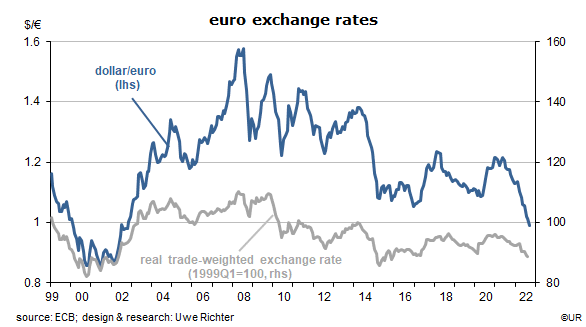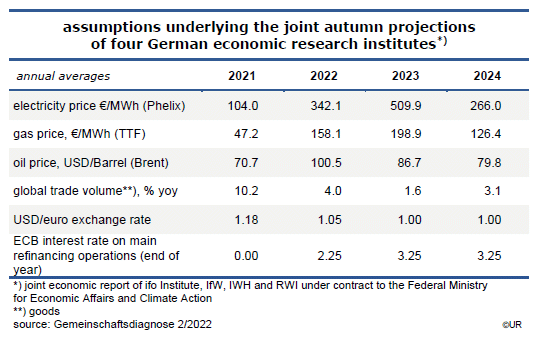
Market Commentary: Germany: shocking inflation rates
Dieter Wermuth, Economist and Partner at Wermuth Asset Management
Less than three years ago, the main concern of policy makers was deflation. When the price level falls, the inflation-adjusted debt burdens of consumers, business and government rise – which holds back borrowing and spending, and thus slows the economy. Things have changed dramatically within a very short period, caused by the end of the Covid pandemic and, more importantly, by Russia’s invasion of Ukraine. Now it is suddenly all about inflation. In August, German producer prices were up 45% from one year ago, while the consumer price inflation rate hit 10.0% y/y in September, the highest since 1951. These are shocking numbers. Usually, producer prices are a reliable predictor of consumer prices which means that these will remain very high for several more months.
The euro exchange rate is another driver of European and German inflation. In spite of sound fundamentals, such as a current account surplus (0.1% of euro area GDP in 2022; US a deficit of 4%) and comparatively low government debt (97% of GDP, compared to America’s 126%) the euro continues to be under selling pressure. Against the dollar it has lost no less than 14% this year. Import prices are exploding. Geopolitical considerations (Russia risk) dominate FX activities these days, with no end in sight. Along the entire yield curve, American interest rates are generally expected to remain about 150 basis points higher than German ones, well into 2023. Interest rates do not always matter for exchange rates, but right now they do: they provide a strong support for the dollar.

If these predictions come true it makes sense to borrow – because interest rates are now far below inflation. The real burden of debt will decline. In addition, a surprisingly robust labor market could make people confident about their ability to repay their debt. Good for the economy? Not quite, because household incomes are presently crashing in real terms as prices are rising much faster than wages and income from property. The standard of living falls, and people become more risk averse. On balance, consumer spending, the main spending component in national accounts, will decrease from here on and drag down the whole economy.
The country’s four leading economic research institutes have just presented their new short and long-term forecasts. For 2023 they now expect that real GDP will decline by 0.4% y/y. In their spring report the forecast had been an optimistic plus 3.1%. This is the largest downward revision ever (-3.5 pp) between two reports, six months apart. The main assumptions are those for energy prices: gas prices will rise by 320% between 2021 and 2023, electricity prices by 390%.

Clearly, the Energiewende (energy transition) has been a major policy problem. It was too timid. The dependence on Russian gas and oil persisted while most of Germany’s nuclear power plants were switched off. Alternative energy sources could not fill the gap – their expansion has been rapid, but not rapid enough in case Russia would stop gas supplies altogether. This has happened now.
The coming months will be difficult, but the situation looks manageable – if the winter is not extremely cold. A combination of energy savings (in response to extremely high prices), regulations, substitutions, an extension of the life of the three remaining nuclear power plants and alternative sources of supply (new LNG terminals) will limit the damage. Gas storage tanks are about 90% full.
But what if winter temperatures fall significantly below normal while Russian gas does not flow anymore? According to the four institutes’ models real GDP will then fall by almost 8% y/y in 2023, the deepest recession in peace times since the depression of the late 20s/early 30s – which had led to the rise of Hitler and his Nazi Party. This time around, the government is in a much better fiscal position, with government debt about 69% of GDP and 10y bond yields of only 2.1%. Germany also holds the world’s second largest net foreign assets ($ 2.8 tr), behind Japan. In other words, Germany has a lot of dry powder which can be and will be used to stimulate demand and to avoid mass unemployment.
For financial investors, the situation is pretty straightforward. The recession has begun, in Germany as well as in the remainder of the euro area. Profits are coming under pressure. Inflation expectations are rising, just as policy rates and longer-term interest rates. All this is bad news for both bond and stock markets. I am not so sure about exchange rates: the interest rate gap between the US and the euro area will probably not widen anymore. Therefore, the depreciation of the euro will come to an end unless, that is, the war between Russia and Ukraine intensifies again – in that case the dollar will appreciate further, as the ultimate safe haven currency.
###
For more information please contact:
Instinctif Partners
Lars Hofer
E lars.hofer@instinctif.com
T +49 162 562 8917
Visit us: https://wermutham.com/
Follow us on Twitter and LinkedIn
About Wermuth Asset Management
Wermuth Asset Management (WAM) is a Family Office which also acts as a BAFIN-regulated investment consultant.
The company specializes in climate impact investments across all asset classes, with a focus on EU “exponential organizations” as defined by Singularity University, i.e., companies which solve a major problem of humanity profitably and can grow exponentially. Through private equity, listed assets, infrastructure and real assets, the company invests through its own funds and third-party funds. WAM adheres to the UN Principles of Responsible Investing (UNPRI) and UN Compact and is a member of the Institutional Investor Group on Climate Change (IIGCC), the Global Impact Investing Network (GIIN) and the Divest-Invest Movement.
Jochen Wermuth founded WAM in 1999. He is a German climate impact investor who served on the steering committee of “Europeans for Divest Invest”. As of June 2017, he was also a member of the investment strategy committee for the EUR 24 billion German Sovereign Wealth Fund (KENFO).
Legal Disclaimer
The information contained in this document is for informational purposes only and does not constitute investment advice. The opinions and valuations contained in this document are subject to change and reflect the viewpoint of Wermuth Asset Management in the current economic environment. No liability is assumed for the accuracy and completeness of the information. Past performance is not a reliable indication of current or future developments. The financial instruments mentioned are for illustrative purposes only and should not be construed as a direct offer or investment recommendation or advice. The securities listed have been selected from the universe of securities covered by the portfolio managers to assist the reader in better understanding the issues presented and do not necessarily form part of any portfolio or constitute recommendations by the portfolio managers. There is no guarantee that forecasts will occur.
Read the full article in PDF format here: English.